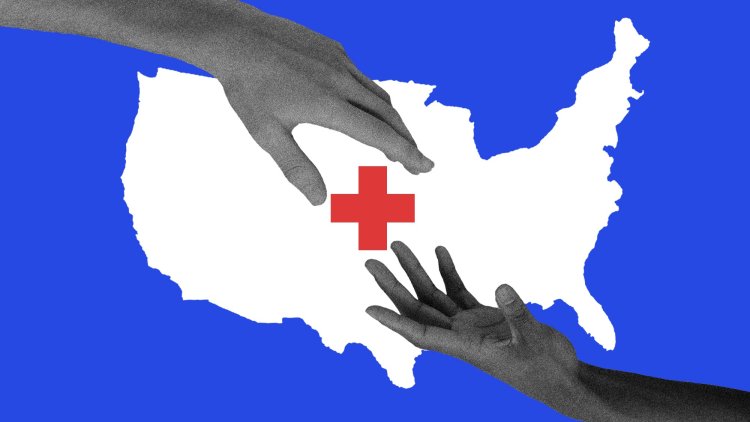The Health-Care System Isn’t Hopeless
There are better solutions than vigilante violence.

Earlier this month, the chief executive officer of UnitedHealthcare was assassinated during morning rush hour on a busy block in Midtown Manhattan; the alleged killer’s confession went viral, in particular the line “the US has the #1 most expensive healthcare system in the world, yet we rank roughly #42 in life expectancy.”
The murder led to a mass airing of grievances with American insurers and, among those who felt that the industry had it coming, a haunting moment of collective glee. What it did not lead to is any focus on policies that could make health insurance and the broader health-care system work better. Both the horrid act of violence and the flippant reaction to it struck me as tragic, because there are, in fact, many ways to make things better. The system is broken. But its problems are not intractable. Nor are America’s politicians incapable of making commonsense, even bipartisan, improvements.
The problems are severe, to be clear. Americans spend more on health care than the citizens of any other country, and get less for it. Insurance does not really function as insurance here, in that it fails to shield policyholders from debilitating health-care costs. Premiums are obscene: The average family paid $23,968 for a private, employer-sponsored plan in 2023. So too are out-of-pocket costs. Nine in 10 workers who get health insurance through their job have a deductible, up from six in 10 15 years ago. The average deductible for single coverage is $1,735, meaning that workers need to pay $1,735 of their own bills before insurance kicks in. The government allows family plans to have deductibles as high as $16,100 a year.
[Graeme Wood: Luigi Mangione’s commonplace, deplorable politics]
As a result of the country’s high out-of-pocket costs and stingy coverage, 41 percent of American adults have medical debt. Hospital bills are a major driver of bankruptcy filings. And many Americans with coverage still skip visits to the doctor and forgo prescription medication because they cannot afford them.
Moreover, the country’s insurers drive up overall health spending, rather than holding it down, as they are meant to. Excess administrative overhead costs the country an estimated $248 billion annually, according to one estimate. The policy analyst Matt Bruenig has noted that in the United States, out of every $100 paid to a private insurance company, just $68 goes to health care. In a single-payer system, such as Britain’s National Health Service, the figure is $87.
The country’s insurers are a major hassle for consumers, as well as employers, hospitals, and doctors. The Kaiser Family Foundation has found that more than half of insured adults experience problems using their coverage every year: having a claim denied, struggling to find an in-network provider, failing to get a timely preauthorization. The sicker a person is, the worse their opinion of their insurance. Insurers also act as a barrier to critical care and necessary medications.
What to do? While condemning the murder, the progressive stalwarts Bernie Sanders and Elizabeth Warren acknowledged the pain insurers cause. Both have suggested the country make a radical policy shift to a single-payer system. Medicare for All and similar proposals would do away with private insurance, instead enrolling Americans in the popular, efficient program covering seniors today.
The benefits and perils of such proposals lie in their disruptiveness. On the one hand, Americans would never need to worry about losing coverage or have to negotiate with an insurance company again. Businesses would not need to manage their employees’ health policies, or pay their share of worker premiums. The government would have much greater capacity to hold down costs, negotiate drug prices, and invest in public health. On the other hand, Washington would recode one-sixth of the American economy, putting dozens of insurers out of operation and perhaps wiping out their shareholders. As popular as the proposal is—and it is not that popular—it is likely a nonstarter, particularly with a divided government or Republicans in charge.
There are many beneficial but less disruptive steps for politicians to consider. One would be allowing individuals to buy in to Medicaid, lowering the Medicare eligibility age, or automatically enrolling children in Medicaid, regardless of their parents’ income. Creating a public option, a popular provision struck from the Affordable Care Act, would be another possibility. Millions of Americans prefer Medicare to private insurance: There are out-of-pocket costs and premiums, but they are much lower than in private insurance. And Medicaid, provided to low-income Americans, has extremely limited out-of-pocket spending.
[From the September 2009 issue: How American health care killed my father]
The country could also do what most European countries with private health insurers do: Regulate them much more strictly. Prescribe in greater detail and with greater force what insurers must cover. Set costs and reimbursement rates. Make the insurers compete—really compete—for consumers’ business, with wide provider networks, low overhead, and simple billing programs. Most Americans want to keep the private insurance system; they just want it to work better.
Many Republican health proposals made thus far would do the opposite, and give insurers more power to deny participants’ claims or raise their premiums. But the Trump administration is ideologically heterodox. Elon Musk, perhaps Donald Trump’s most prominent policy adviser, has suggested that the country should make medications like Ozempic widely available at a “super low cost to the public.” Washington could negotiate directly with the drug manufacturers; it could do so for all prescription medications, if Congress wanted it to.
Elected politicians have avoided making any of these changes—because of ideological reasons, fierce lobbying from insurers, or simple inertia. But many of them are popular across the political spectrum. Americans, apparently so fed up with the system that they’re willing to consider vigilante violence an appropriate response, should be calling their reps instead. There are better solutions than a gun, which left one man dead and no sick Americans any better off.
What's Your Reaction?




















